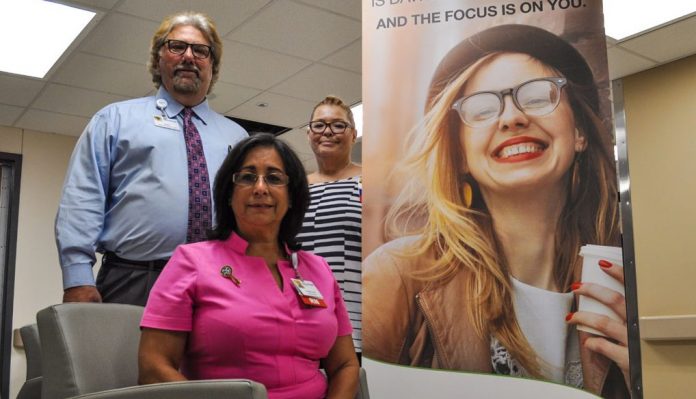
by Bobby Anderson
Staff Writer
With mental health services in our state disappearing at an alarming rate AllianceHealth Midwest has doubled its commitment to helping patients.
The hospital has opened a new mental health unit featuring 32 patient rooms, large community rooms, a group therapy room and occupational therapy room. The hospital now has 72 beds and has a special focus for seniors.
In behavioral health for 25 years, James Hutchison was brought in by the health system to open the new unit.
“They needed experienced leadership from the psychiatric perspective,” Hutchison said. “They needed someone to grow them through the expansion. I fix things.”
Hutchison said for the last year the hospital was forced to turn away 75 seniors and 25 adults each month due to space restrictions.
The hospital applied to the state for a certificate of need in order to begin building.
Judy Anderson, RN, has been a nurse for 37 years now. She said the new facility is a blessing for all involved.
“This is going to be really nice for seniors, it’s state of the art, it’s something for them,” Anderson said. “I think people tend to push seniors back and we’re pushing seniors forward and that’s what I think is so important. A lot of people will instead of dealing with someone with Alzheimer’s or dementia they’ll put them in a nursing home and just not deal with them.”
DEALING WITH THE PROBLEM
Anderson understands that just because someone begins to show signs of dementia or Alzheimer’s doesn’t mean that they immediately need to be in a long-term care facility.
“If we have them here sometimes we can get them on the right medication and they can go home and live successfully there for years,” she said.
Anderson said many times when you begin seeing a change in your loved one it can be spurred by treatable medical conditions sometimes as simple as a urinary tract infection.
“If we can get them in here early enough and address their medical problems … early onset dementia can be stopped with (medication) and they can go home and lead a normal life for a long time. We just have to get the public aware there are other alternatives.”
“People don’t live it until their parents have it.”
Gloria Ceballos, RN, PhD, serves AllianceHealth Midwest as the chief nursing officer. She said the hospital has a special focus on senior adults.
“It’s a commitment because our community needs it,” Ceballos said. “This unit will never cure anybody. This unit is here to address the crisis. We do know how to treat them with medications or trying some other treatment and incorporating the family.”
Hutchison said having a facility like this in place not only helps the patients and their families but the community as a whole.
When an untreated mental health patient acts out often times law enforcement is called.
“They pick up people with mental health issues and they don’t have any place to take them,” Hutchison said. “They take them to the emergency department because that’s their only option. There emergency department holds them one to two hours or one to two days. If that person is under arrest the officer has to stay with them that whole time which takes them off the street for hours.”
Once the patient leaves the hospital, Hutchison said they will often commit a crime whether intentionally or unintentionally.
“We’ve had a lot of patients say they don’t know what else to do. They do this because they don’t have any place to live or get medicine,” Hutchison said. “It causes a huge problem for law enforcement and the community because there is no place for them to go.”
The new facility will serve as a stabilization and treatment point at a time when providers are leaving the mental health arena.
“This hospital has basically invested a huge amount of money at a time when a lot of other places are closing,” Hutchison said. “Everybody knows about the legislative issues with funding so at a time when everyone is scaling back we spent a fortune on this floor.”
Providing a safe transition point is the focus and Anderson says AllianceHealth Midwest nurses are there to serve seniors in whatever capacity they need.
“I think one of the most important things we do here is not medication it’s listening, listening to the family about the problems and listening to the patient to find out what’s really going on,” Anderson said.













